My mother is an incredible story teller. Many family friends frequently invite themselves over for dinner just to hear her old stories from China. She was an American Literature major in graduate school, but hasn't written for ages. Upon hearing about Steemit, she had the idea of writing down her stories and sharing them with all of you. After the success of her first story about her name, she has been full of excitement and joy with the new prospects of story telling on Steemit. She plans on writing short stories such as the one below, sharing them all exclusivley on Steemit, and eventually combining all of the stories into a memoir book. I hope you enjoy the following words from my mom!
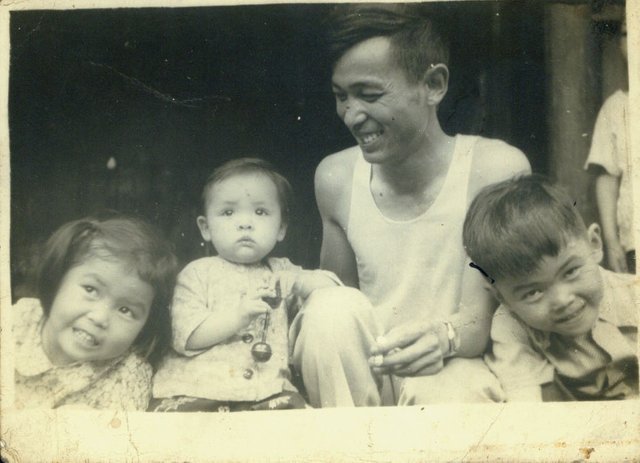
A photo of my father lovingly adoring his first born daughter (1957). There other two children on the side of the photo were my father’s nephew and niece.
My father was born in June of 1929 into a prosperous landlord family in Suining county, in the southwest region of China. His great-grandfather Cai Ming Xuan (1845 – 1942) was a well-known artist of Chinese traditional painting and collector of Chinese art and calligraphy. Cai Ming Xuan had five sons, two daughters and about thirty grandchildren. When my father was born, the whole family was overjoyed to add another son – a symbol of good fortune and lasting family linage. Before my father, my grandparents had three children – my father’s oldest sister, older brother and second older sister. The birth of a son called for a big celebration. A grand banquet was prepared for the whole extended family right after my father was born. My grandmother took a bath and dressed up beautifully for this big happy occasion. Shortly after the banquet, she became extremely ill and died of puerperal fever. The source of the bacteria was the untreated bath water.
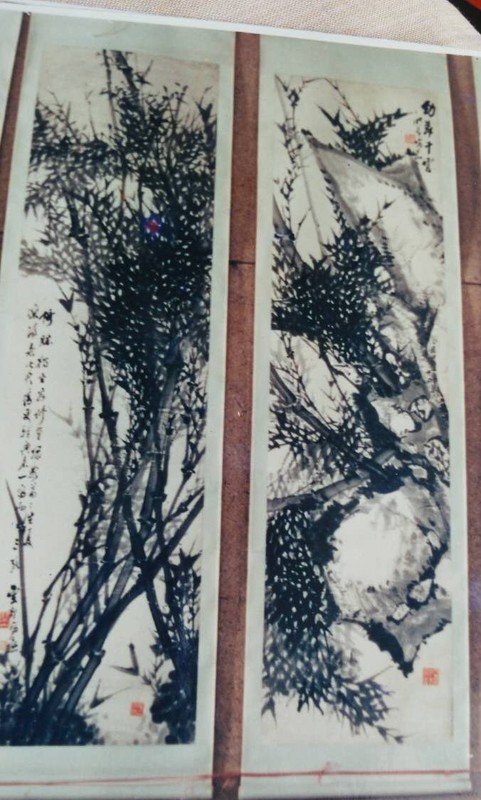
Two paintings by my father’s great-grandfather Cai Ming Xuan hung at the museum of Suining City, my father’s hometown. Bamboo was his favorite subject since it symbolized strength, resilience and persistent life force.
My grandfather married again shortly after this. His second wife died not long after the wedding from a sore on her foot infected by an accidental peck of a rooster. My grandfather married again shortly after the death his second wife. Sadly for my poor father, the third wife my grandfather married to was a manipulative, jealous and small-hearted woman who did not love my father because he was not blood related to her. The mistreatment of my father from her intensified after she gave birth to her own son three years later.
Because my father and his half-brother were close in age, they played and went to school together. However, my father’s step-mother would dress her own son with clothes of expensive silk while my father only wore clothes of plain cotton. When the servants sent lunches to the two boys at school, the food in my uncle’s lunch box would contain lots of meat and fish while my father’s would have coarse food with pickled vegetables and very little meat. Both my father and my uncle were very talented with Chinese traditional painting, but only my uncle received special tutoring and he later became a professional and well-known artist of both Chinese traditional painting and Western oil painting.
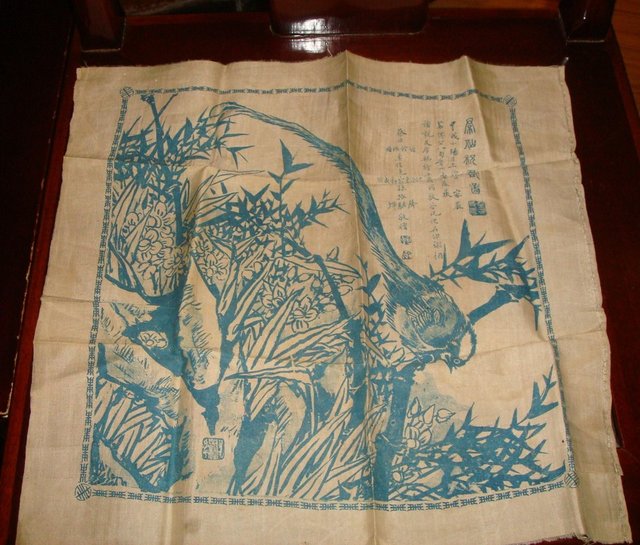
A painting by my father’s great grandfather printed onto a silk handkerchief. On the right top corner are the names of his sons, grandsons and great grandsons. This painting was done in 1934. My father, his older brother and younger half-brother were his only three great grandsons born then. My father’s father and step mother had four children total, two boys and two girls, the youngest was a son whose nickname was “Double Happiness” because he was the second son to his parents. Please note that my father’s great grandfather had daughters and many granddaughters but none of their names appeared on this handkerchief because of their gender.
My father’s grandmother loved him very much and would try to protect him from too much abuse from his step-mother. My father was emotionally attached to his grandmother. Once when my father was a teenager, the women in the household were playing Majiang game. My father’s step-mother lost and his grandmother won. My father showed much happiness and excitement for his grandmother and somehow this evoked the bad feelings from his step-mother. She yelled and asked my father to leave, and threaten to spit on him. My father said “I dare you!”. To his biggest shock, his step-mother actually spit right onto his face! This spit stayed in my father’s memory the rest of his life. He never forgave his step-mother. He was very angry with his father for allowing this woman to mistreat him this way. His father would not do anything to stop his wife, instead he would try to pacify my father by saying to him “好男不与女斗”, a Chinese expression meaning “A good and virtuous man should not fight with a woman”.
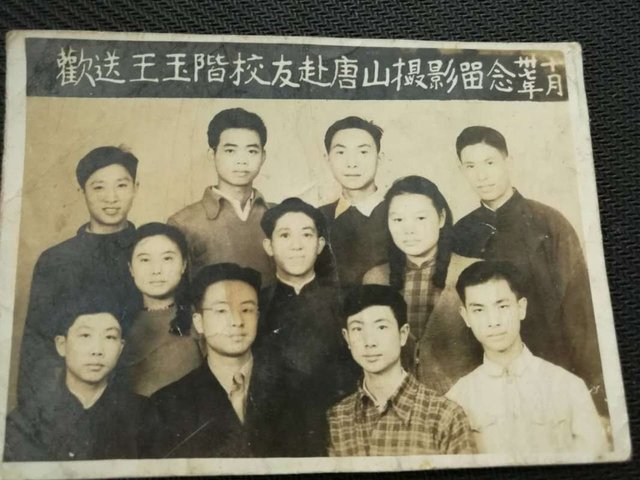
A photo of my father with his classmates in high school taken in October 1947 in Chengdu, Sichuan.
My father left his hometown and went to Chengdu to attend high school, and later on he was accepted by Chongqing University majoring in textile studies. As a young man he was idealistic and was attracted to Communist ideology. He joined the Communist periphery organizations. Despite his landlord family background, he was recruited by the Communist party because he was ideologically progressive and rejected his landlord family. He remained in Chengdu and worked for different government agencies until he retired in 1987.
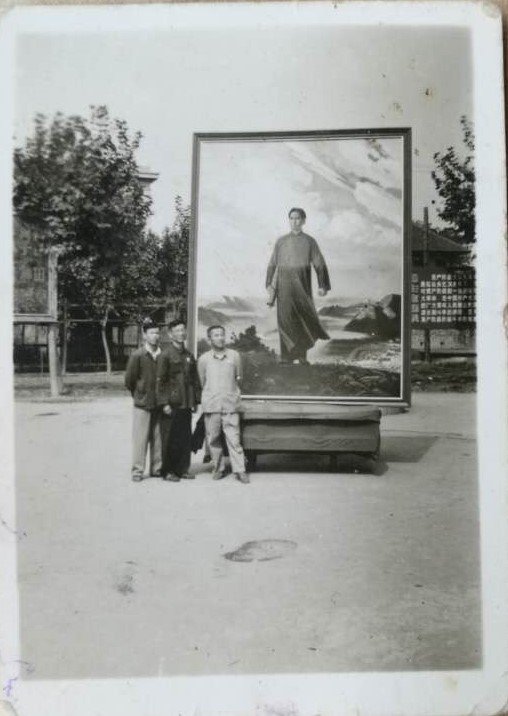
A photo of my father (in the middle) with his older brother (on the right) and younger brother (on the left) in front of the oil painting painted by my father’s younger brother who was the artist of the family. The painting was the portrait of Mao Ze Dong on his way to organize the workers movement in AnYuan in 1921. This painting was on display at the government agency where my father worked during the Cultural Revolution in 1968.
Right after the establishment of People’s Republic of China in 1949, the government started the “Land Reform” movement. My grandfather’s land was confiscated by the government and distributed to the peasants. During two years of the Land Reform (1950 to 1952), the government mobilized the peasants to “fight the landlord”. They confiscated land and physically abused and executed the landlords. Many were executed during this time. My grandfather was kidnapped, blindfolded, and taken to an execution site. Here, he was forced to witness the executions of other landlords, unknowing if he would be next. He was also forced to stand between two pinwheels with two fans blowing air on him from both sides until he fell down. He went home that day and became very ill. He died shortly after. During the Land Reform movement, the Cai family also lost all their property and personal belongings. One of my grandfather’s cousins had to hand over eight trunks of valuable Chinese traditional paintings and calligraphy collected by my father’s great-grandfather to the government.

A photo of my parents right after they got married in the early 1950s. They were posing in front of a government building with Chinese characters which stated “The Proletarians of The World Unite!”
As a child, I have never heard my parents mention anything about my grandparents. I only learned that my family was from the “evil landlord class” from other children in our neighborhood when we were having a fight. However I was not bothered too much by this stigma growing up because my father was a middle level cadre and had a respectable position working for the government. Growing up in the sixties and seventies in China, children had to fill out all kind of forms to attend schools or participate in various activities. All the forms would always have an item we needed to fill out: 家庭出身” Class Status of The Family”. During the Maoist years Mao Ze Dong instructed the nation that “We need to talk about class struggle yearly, monthly and daily”. It was a huge embarrassment, humiliation and disadvantage for any children who had to fill out “landlord” or “capitalist” and any “bad elements” of the society as their “Class Status of the Family”. In my case, I would always proudly put down “Revolutionary Cadre” as the class status of my family. I became curious about my father’s family background only after I became an adult living in the United States. On one of his visits to my home in California, I sat down and interviewed my father and he shared with me stories of his childhood with enthusiasm. I am writing here to share my father’s story with you and I hope you have enjoyed it.
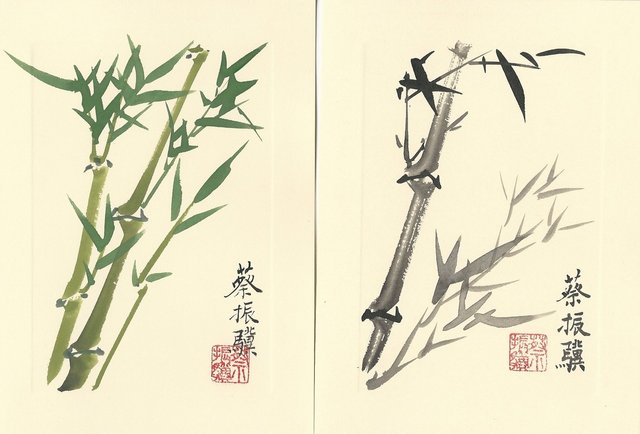
Two cards that my father painted for me when he visited me in California in 1990. He received no professional training but he taught himself how to draw Chinese traditional paintings and was an amateur artist.

My father posing for a picture with my oldest sister at the People’s Park in Chengdu 1958.
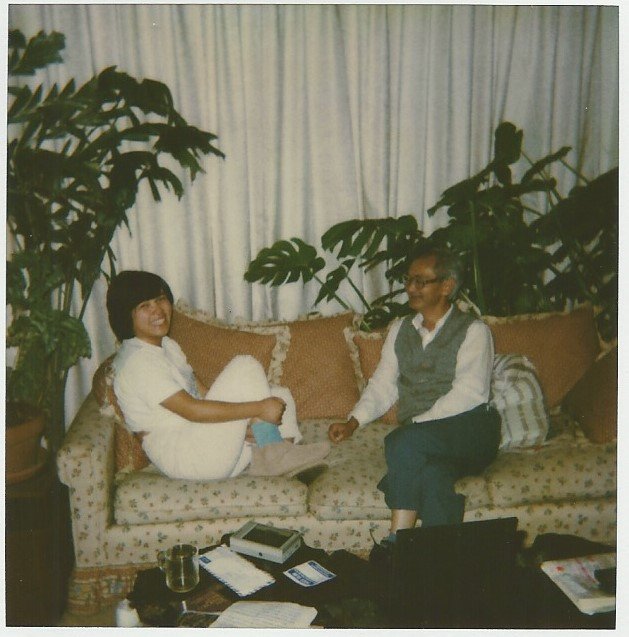
A photo of my father and I in 1990 at my home in California. My father was sharing with me his stories and I taped his stories on the audio tape. My father had a great sense of humor and he had just made me laugh with one of his jokes. This photo was taken by my husband Bill Baumeister.
This post has so much Mao to it than I expected.
Downvoting a post can decrease pending rewards and make it less visible. Common reasons:
Submit
You are well jong in the land of puns.
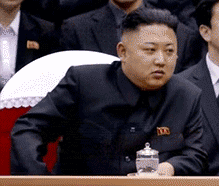
Downvoting a post can decrease pending rewards and make it less visible. Common reasons:
Submit
Maybe we will attract Adolf
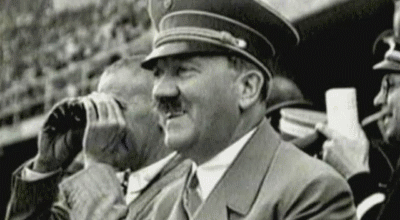
Downvoting a post can decrease pending rewards and make it less visible. Common reasons:
Submit
Just Stalin for time till I think of another one.
Downvoting a post can decrease pending rewards and make it less visible. Common reasons:
Submit
You are Hussein!

Downvoting a post can decrease pending rewards and make it less visible. Common reasons:
Submit
I don't like this game
Downvoting a post can decrease pending rewards and make it less visible. Common reasons:
Submit
I'm Putin up with it for now.
Downvoting a post can decrease pending rewards and make it less visible. Common reasons:
Submit
I find the smiles in these photos to be so moving. So much love and joy in them! Thank your mother for sharing these stories. They are fascinating and a true gift to readers.
Downvoting a post can decrease pending rewards and make it less visible. Common reasons:
Submit
Thank you @anwenbaumeister ! I'm loving this series. It's a wonderful tribute to your family and also takes us to a different place, a different world. Hope to see more!
Downvoting a post can decrease pending rewards and make it less visible. Common reasons:
Submit
Great story. Thanks
Downvoting a post can decrease pending rewards and make it less visible. Common reasons:
Submit
Thanks for sharing
Downvoting a post can decrease pending rewards and make it less visible. Common reasons:
Submit
Communism is destroying my country (Brazil) in theory communism would be good, more in Pratica are disastrous.
Downvoting a post can decrease pending rewards and make it less visible. Common reasons:
Submit
I know this prolly wont help u, but the other systems are the same bullshit in green. Every single one of them is basically build to fail, because human greed doesnt allow others to live as well. There will always be one whos jealous because stupid. Thats kind of a vicious circle imo :(
Downvoting a post can decrease pending rewards and make it less visible. Common reasons:
Submit
The same is happening in Venezuela, this communists is killing us without food and medicine, they just are hemorrhaging my country and taking it into bankruptcy.
Downvoting a post can decrease pending rewards and make it less visible. Common reasons:
Submit
These kinds of stories are great. Original stories from your heritage previously unpublished. This is steemit crypto-gold!
Downvoting a post can decrease pending rewards and make it less visible. Common reasons:
Submit
Hi, your post is now in the TOP 10 trending posts on Steemit so I've added it to the [Flipboard Steemit Trending Magazine][https://steem.ly/FlipboardSteemitTrending) for everyone to see it. Nice work!
Downvoting a post can decrease pending rewards and make it less visible. Common reasons:
Submit
What a story, so amazing!
Downvoting a post can decrease pending rewards and make it less visible. Common reasons:
Submit
Just shocking what happened there that so many don't realize.
Downvoting a post can decrease pending rewards and make it less visible. Common reasons:
Submit
that's really nice
Downvoting a post can decrease pending rewards and make it less visible. Common reasons:
Submit
Exciting! + Good old photos.
Downvoting a post can decrease pending rewards and make it less visible. Common reasons:
Submit
This history must be kept and uprisen, thank you so much for sharing! Namaste :)
Downvoting a post can decrease pending rewards and make it less visible. Common reasons:
Submit
this is quality! thanks for sharing
Downvoting a post can decrease pending rewards and make it less visible. Common reasons:
Submit
This is so powerful. I love all of the pictures - by the end I felt that I knew him myself! Thank you so much for sharing :) I am an aspiring author myself, so if you had a moment and could give me feedback or tips on how to best use this site to further my abilities, I would be incredibly touched.
Downvoting a post can decrease pending rewards and make it less visible. Common reasons:
Submit
This is an amazing article, and I love the pictures. Without Steemit how would I have ever found such a treasure. Thank you for sharing!
Downvoting a post can decrease pending rewards and make it less visible. Common reasons:
Submit
My Great-Grandmother lived with my family when I was young. She told me so many stories about her life, her family and grandparents. I wish I had known as a boy how much those stories, half-remembered, mean to me now.
Downvoting a post can decrease pending rewards and make it less visible. Common reasons:
Submit
I enjoyed much reading your parents' story... Chengdu is where I am originally from as well. Look forward to reading more! :)
Downvoting a post can decrease pending rewards and make it less visible. Common reasons:
Submit
thanks for sharing your great story
Downvoting a post can decrease pending rewards and make it less visible. Common reasons:
Submit
interesting read
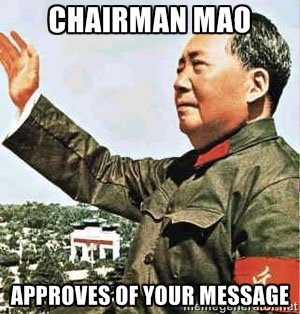
Downvoting a post can decrease pending rewards and make it less visible. Common reasons:
Submit
觉得两幅画很美。应该还有更多作品吧?
Downvoting a post can decrease pending rewards and make it less visible. Common reasons:
Submit
Photos are great- gave a glimpse of the old China. Right now, even thought i am living in Shanghai, a mega city, but I have been more inspired by your photos which travel back in time.
Downvoting a post can decrease pending rewards and make it less visible. Common reasons:
Submit
It's great that you're able to track plenty of the family's past. I tried searching recently. It's like my entire lineage has been wiped off from memory lol..
Downvoting a post can decrease pending rewards and make it less visible. Common reasons:
Submit
this article made me cry
Downvoting a post can decrease pending rewards and make it less visible. Common reasons:
Submit
I enjoyed your story
Downvoting a post can decrease pending rewards and make it less visible. Common reasons:
Submit